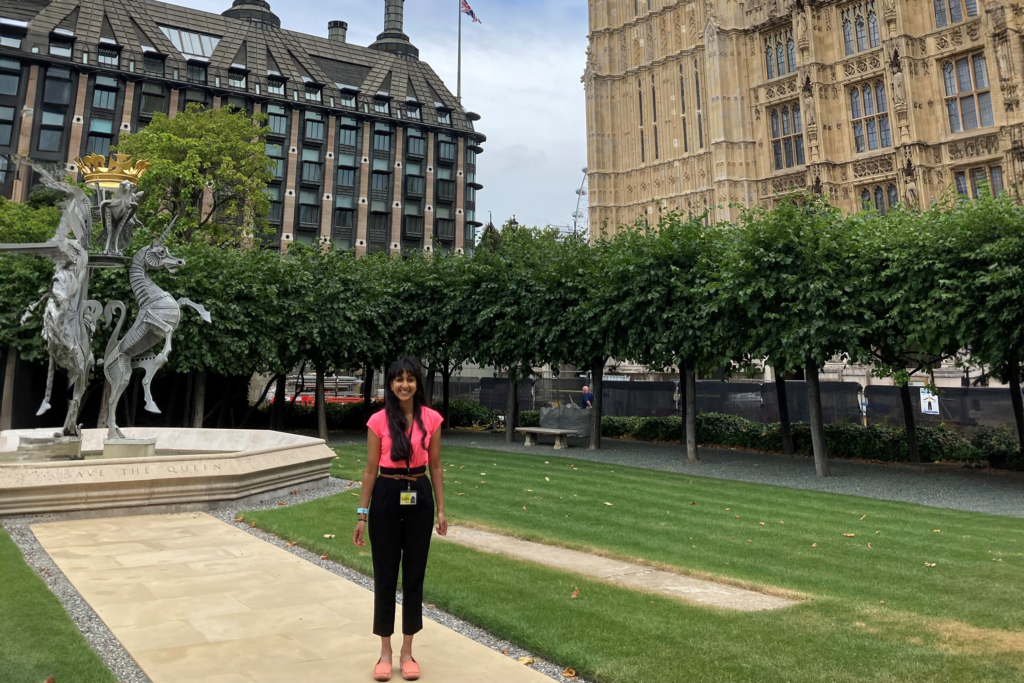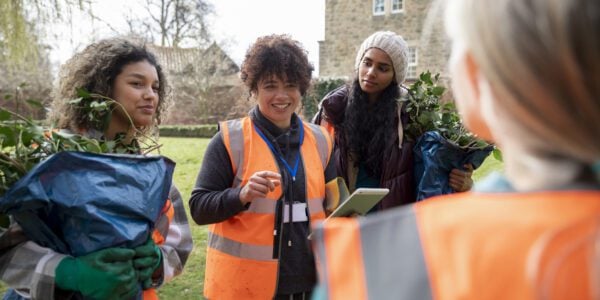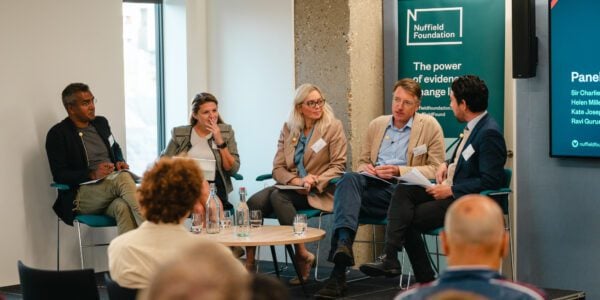Devyani Gajjar shares her journey from Fellow to physical sciences and digital adviser at the Parliamentary Office for Science and Technology
Our POST Fellowships provide successful candidates with the opportunity to work on exciting new research and play a central role in keeping policymakers up to date with the latest evidence. For Devyani, that meant examining the debate around assisted dying. Devyani successfully applied to the scheme in 2022 and credits her Fellowship experience as one of the primary reasons she chose to look for a permanent role at POST.
POST Fellows gain a unique insight into how impartial research and evidence is gathered and disseminated to key stakeholders and, in turn, how it can influence policy decisions. Learn more about the scheme here. If you’re interested in applying, the deadline for 2023 is 5 November.
What interested you about doing a POST fellowship and how did you find the application process?
I always knew there could be a gulf between academic research and those with decision-making powers, so I was interested in exploring future career options that would help bridge this gap. The Fellowship seemed like it would give me a taste of what that kind of work—policy research—would be like. POST itself was another major reason I applied. Its work focuses on cutting-edge topics at the intersection of science, technology and society, which is what I’m passionate about.
The application process involved writing a short briefing note and an interview. It was challenging and took time, but I enjoyed it and thought it was a good way to get a flavour of the Fellowship; the more I prepared, the more I knew it was something I wanted to experience.

You produced a POSTnote on assisted dying. Can you outline the process and how it fits with the other work you undertook at Parliament?
The bulk of my fellowship involved producing a POSTnote on assisted dying. A POSTnote is effectively an impartial and well-evidenced briefing on a particular topic. For the research, I interviewed experts across academia, non-profit sectors, government, and parliament who were instrumental in navigating the debates around assisted dying. Working with my POST supervisor, Dr. Abbi Hobbs, I drafted the POSTnote and built on feedback from internal and external reviewers.
Assisted dying is a sensitive topic; individual experts and organisations have expressed strong feelings about it. As I wrote the POSTnote, I felt a sense of responsibility to make sure all the evidence was presented impartially and that all the different points of view were represented, which was hard but incredibly rewarding.
What was your favourite part of your fellowship?
I had an amazing time! The Nuffield Foundation was very generous with travel expenses, so I was able to go into Westminster most days, which was a massive part of the experience because you’re at the heart of where everything is happening. I often walked past reporters talking to cameras in Parliament Square, had lunch in Westminster Palace, attended Prime Minister’s Questions, spotted several MPs and made friends with other Fellows.
Overall, I found the work very fulfilling. I knew I was working on something that would have an impact and be used by parliamentarians — that the POSTnote I produced could help decision-makers make informed choices on laws directly affecting people.
What new skills and opportunities did you gain that you applied in your PhD or wider research?
Throughout the Fellowship, I improved my skills in writing concisely, accurately, impartially and precisely for policymakers, which has hugely improved my confidence in my abilities. I’ve also become much better at meeting tough deadlines and simplifying complex topics. When I returned to my PhD, I could better manage time constraints and pressures, which are common in the third-year thesis write-up phase!
On top of building my strengths, I gained insight into how parliamentary scrutiny works and the different types of research that take place, such as in the House of Commons Library.
Finally, I worked for a day at the Nuffield Foundation and gave a talk about my Fellowship, which gave me the opportunity to grow my network and speak to people about my research.
I knew I was working on something that would have an impact and be used by parliamentarians — that the POSTnote I produced could help decision-makers make informed choices on laws directly affecting people.
You now work as a Digital Sciences Advisor at POST. Can you tell us more about the role and why you wanted to join the team
The Fellowship was very rewarding. The POST team was friendly and the wider environment encouraged me to pursue personal and professional growth. It was largely because of these factors that I thought I would enjoy a permanent research job in parliament, so I kept an eye out for opportunities and got lucky when one came up towards the end of my PhD.
My role is very dynamic and varied, which keeps it interesting! I’m involved in recruiting and supervising PhD Fellows, writing briefings, developing potential research proposals, providing committee support, building and maintaining a network of stakeholders, and keeping up to date with cutting-edge physical sciences and digital topics. I think the wide scope of my role suits me.
What are the most exciting projects you’ve worked on in your role as Digital Sciences Advisor and what have you gained from the experience?
I’m currently researching a briefing on AI technologies. It’s very exciting to produce accessible and reliable information on topics that are of huge interest to both the public and policymakers. I’ve also recently started supervising PhD Fellows. My Fellowship really helped to shape my future career path, so it’s a privilege to now be in a position where I can potentially help shape others’ paths.
The role is still new and I’m learning a lot, such as communication, networking, coaching and time management skills, how parliament and scrutiny work, and effective writing. Aside from training and upskilling, there are so many opportunities that come with this job, and I appreciate that I can continue to grow.
Do you have any advice for future POST fellows?
Firstly, don’t be afraid to apply! You never know what prospects it could potentially lead to! In the application process, it’s a good idea to familiarise yourself with current research at POST and how parliament works.
Secondly, there’s lots of opportunities that may come up whilst on a Fellowship such as the chance to go to Prime Minister’s Questions – make the most of them! If you do get the chance to work on the parliamentary estate, then it’s a great experience!
Finally, enjoy it!









